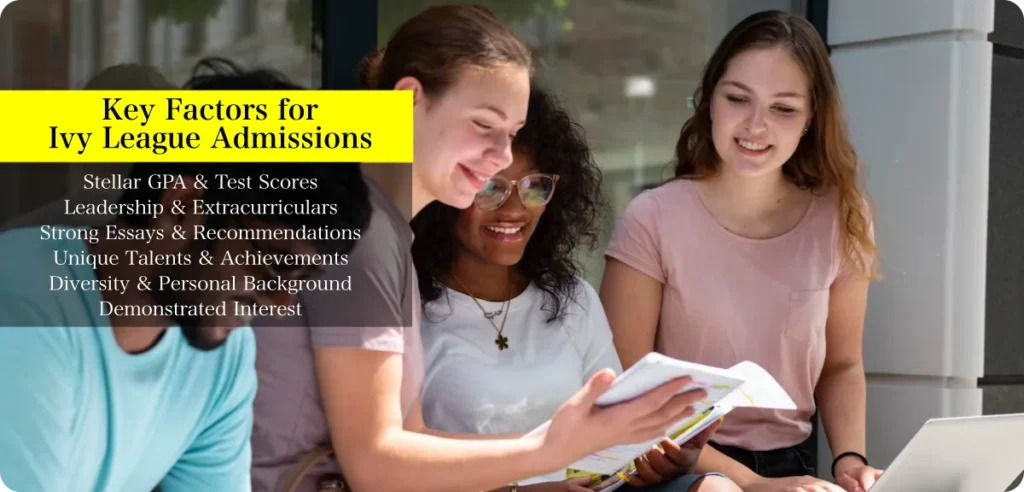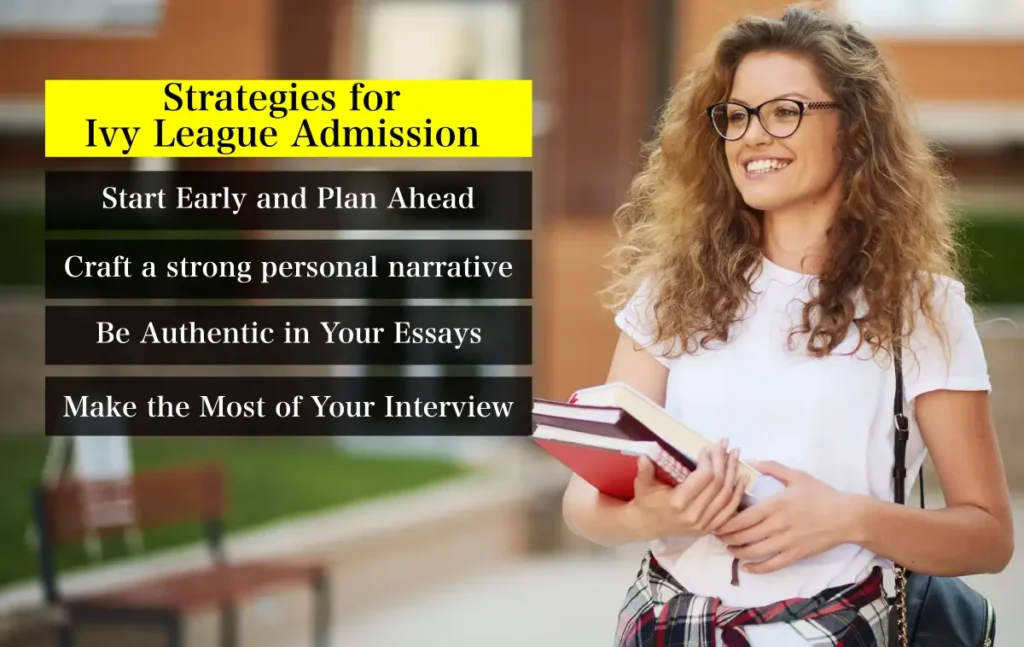Getting into an Ivy League school is a dream of many students, but let’s face it—it’s not easy. With extremely low acceptance rates and thousands of highly qualified applicants each year, it’s easy to feel like the odds are stacked against you. So, what does it really take to get that acceptance letter?
The short answer: there’s no one-size-fits-all formula. Academic achievement is a big part of the equation, but it is far from the whole equation for Ivy League schools; there’s much more to winning their hearts than just having high grades and test scores.
How to Get Into an Ivy League School?
This guide will break down exactly what Ivy League admissions look for, offer expert tips on how to optimize your application, and give you an inside look at the holistic approach that these schools take when choosing their students.
The Ivy League Admissions Process: What You Need to Know

Although each Ivy League school has its specific process, there are several key elements common to them all. Here’s the breakdown of the major components:
- Academic Excellence
Let’s begin with the obvious: Ivy League schools have extremely high academic standards. But they are not looking for only A’s and high SAT or ACT scores. It’s not enough to just be “good” at school—they want to see how well you’ve done within the context of your own environment.
In other words, they want to see that you’ve pushed yourself, challenged yourself, and consistently done your best in your own high school setting. It’s all about showing a passion for learning and a solid track record of achievement.
- Extracurricular Activities
That’s where it gets interesting. Academic smarts are important, but Ivy League schools also want to know what you do outside of the classroom. Being a well-rounded individual can make all the difference.
You may be a leader in your student government, a dedicated volunteer, a star athlete, or a passionate artist, and your extracurriculars are your chance to show what you’re interested in and what you care about. Not merely how many things you’ve done, but how deep into and what you’ve contributed there.
- Personal Qualities and Fit
So what makes you stand out from the sea of well-qualified applicants? In fact, what are those personal qualities that define who you are? These will matter to the Ivies, as much as to any other institution: do you have a character you can be proud of; do you have reasons and motivations for attending that matter; will you fit with the campus culture?. That is why essays, recommendations, and interviews play such a significant role.
They are seeking students who will contribute both academically and socially to their communities, so do not be afraid to show them your true self.
- Essays: Your Time to Shine
Your application essays are your chance to speak directly to the admissions committee and tell them your story. It’s where they get to know you beyond your GPA and resume.
You can tell them what gets you out of bed, what has challenged you, and what excites you about your future. A good essay is personal, authentic, and tells a great story about who you are and why you’d be an awesome addition to their campus.
- Letters of Recommendation
Strong letters of recommendation go a long way. This is because Ivy League universities will ask for letters, mostly from teachers or other mentors who know you up close and personal.
Remember, it is not adequate to have a teacher in general write a letter without you choosing people who give specific examples of how you have excelled, how you have contributed, and how you have demonstrated leadership.
Key Factors That Influence Ivy League Admissions

While academic achievements are crucial, several other factors are involved in the admissions process. Let’s take a closer look at some of the key elements:
- Acceptance Rates and the Impact of Early Applications
Overall, Ivy League schools have a very low acceptance rate; sometimes it is even in the single digits. Early applicants, however, via Early Decision or Early Action, have a higher possibility of getting admitted. It’s often evaluated in a smaller pool, so the advantage is on the applicant’s side.
- The Test-Optional Debate
Many Ivy League schools are test-optional; applicants can choose to not submit standardized test scores. While test scores still play a role for some applicants, they are no longer the defining factor of success.
If you feel good about your scores, submit them. Don’t worry if you think your scores don’t represent your real abilities. Other parts of your application will make up for it.
- Understanding Ivy Day
Ivy Day is the day by which most Ivy League schools would come out with their admissions decisions, but for early decision applicants, they will know first by a good few months beforehand.
On Ivy Day, it is very competitive as getting an offer will, in most cases, involve a combination of academic achievements, personal qualities, and fit within the community at school.
How to Increase Your Chances of Admission to an Ivy League School

While there’s no guaranteed path to getting into an Ivy League school, here are a few strategies to help optimize your application:
Start Early and Plan Ahead:
Plan well in advance and don’t leave it until the last minute to prepare your application. The holistic approach to admissions used by Ivy League schools means every aspect of the application matters.
Make a proper schedule for standardized tests, extracurricular involvement, and college essays to allow time to think over what you want to convey so that your application will be noticed.
Craft a strong personal narrative:
Admissions committees are looking for students who can bring something unique to their campus. Think about how your experiences—academic, personal, and extracurricular—can form a compelling story.
Be sure your application showcases your passions, values, and goals. A strong personal narrative can make a lasting impression.
Be Authentic in Your Essays:
Admissions officers can tell when an essay is contrived. Your personal statement should be genuine and reflect your true voice.
Avoid trying to impress with what you think they want to hear. Instead, share who you are, what drives you, and why you’re passionate about your future. Authenticity resonates more than perfection.
Make the Most of Your Interview:
In an interview, take it seriously, because this is your direct conversation with a school person. It may be an important part of your application. Be prepared to express why you want to be in that particular Ivy League school, what you wish to contribute to the community, and how you visualize your academic future unfolding.
Remember, getting into an Ivy League school is competitive, but it’s not the only pathway to success. Even if you don’t get accepted, there are many other top universities where you can thrive. Stay focused on your academic and personal goals, and know that your journey is about much more than one acceptance letter.
Conclusion
Getting into an Ivy League school requires more than just academic excellence—it’s about who you are as a person, your experiences, and how well you fit into the unique culture of these elite institutions. By understanding the admissions process and tailoring your application to highlight your strengths, passions, and character, you can increase your chances of earning a spot in one of the Ivy League schools.
Take the time to craft an application that truly represents you, and remember that the admissions process is as much about your future goals as it is about your past achievements. Whether or not you’re accepted, the journey itself will be a valuable experience that shapes your growth and academic career.
